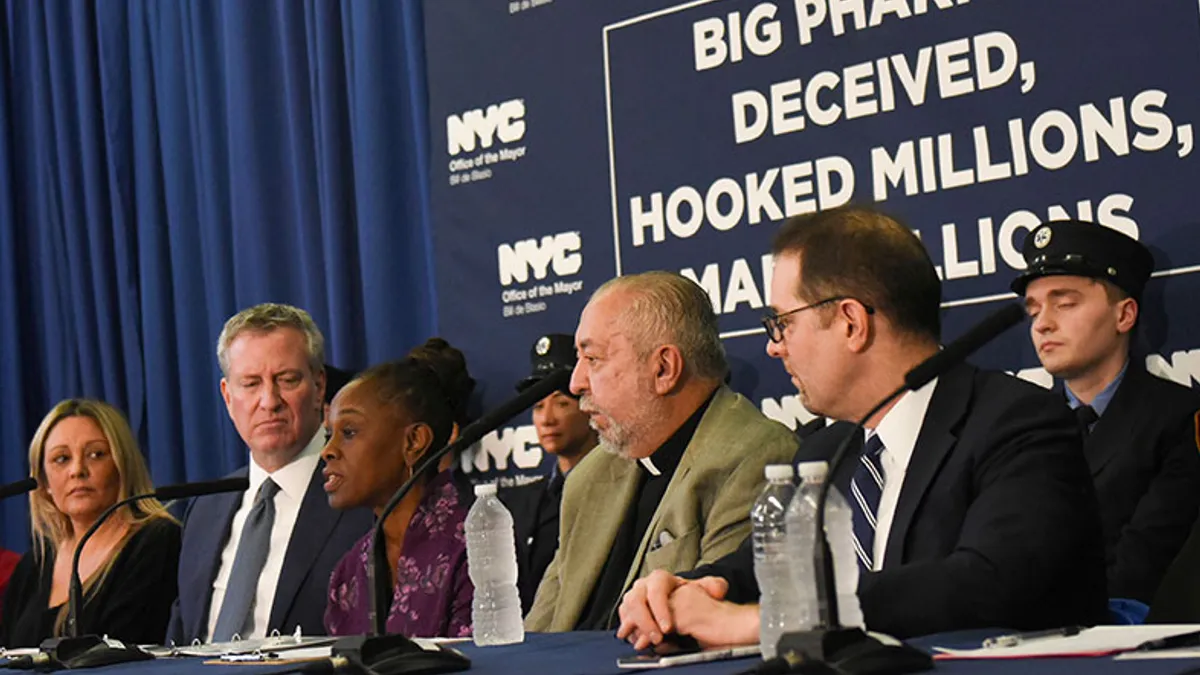Dive Brief:
- New York City Mayor Bill de Blasio announced Tuesday that the city filed a lawsuit against a number of manufacturers and distributors of prescription opioids "to account for their part in the city's ongoing deadly opioid epidemic."
While we're out here looking for solutions to the #opioidcrisis to save lives, Big Pharma keeps making billions. That’s why New York City has filed a lawsuit against major pharmaceutical companies. It’s time for Big Pharma to pay for what they’ve done. pic.twitter.com/xc3JSokJEg
— Bill de Blasio (@NYCMayor) January 23, 2018
- The suit, which is seeking $500 million in damages, names a number of opioid manufacturers, including Teva, Allergan, Endo, Johnson & Johnson and Purdue Pharma, as well as major distributors including McKesson, Cardinal Health and AmerisourceBergen.
- In 2016, more than 1,000 people died from an opioid overdose in New York City, and in 2017, more city residents died from opioid overdoses than from car accidents and homicides combined, according to the mayor's office.
Dive Insight:
Though New York City is now the largest municipality to sue "big pharma," it joins hundreds of cities, counties and even states in attempting to hold these companies accountable for the nationwide opioid epidemic. The U.S. Department of Health and Human Services reports that in 2016, 116 people died every day from opioid-related drug overdoses, while 11.5 million people misused prescription opioids and more than 17,000 deaths were attributed to overdosing on commonly prescribed opioids.
Some of these opioid suits draw parallels to suits filed against the tobacco industry in the late 90s, which argued that tobacco companies should be held responsible for the addictive drug and its harmful effects. Following a 1998 Master Settlement Agreement involving the tobacco industry and nearly all U.S. states, the industry was left to pay in perpetuity for states' anti-smoking campaigns and health programs.
The success of that settlement — the largest civil litigation settlement in U.S. history — may suggest some optimism in the efforts of cities and states to target pharmaceutical companies. However this issue is different in that it is hard to blame opioid manufacturers and distributors for their customers' misuse or overuse of the drug.
This is the second big lawsuit coming out of Mayor Bill de Blasio's office this month, following legal action taken against five major oil companies for their contributions to climate change. The New York Times reports that these lawsuits may be a "new favored tactic" by de Blasio to raise his profile on a national level. However the tactic may create backlash if some begin to perceive this action as a way to place the blame of his city's shortcomings on the shoulders of industries.
As some cities face these pharmaceutical manufacturers and distributors in court, others are taking matters into their own hands to combat the crisis. Cities such as Cary, NC are testing drug-detecting robots in their sewers to track drug use, while others like Philadelphia are making efforts to host safe-injection sites. Despite the success of suits from New York and others, these initiatives indicate there is more that can be done internally to end this public health crisis.











